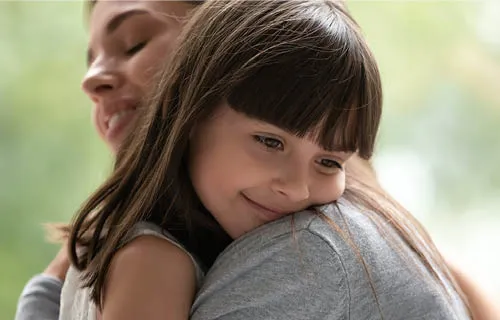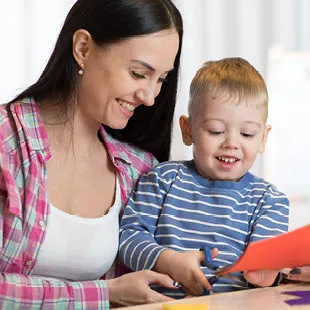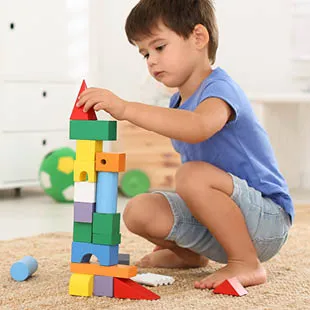A brighter tomorrow begins with children: Child development, preschool education, school readiness

A few personal words to all interested parents
Thank you for your interest in early childhood education and developmental support. Life with children is often challenging, and between household tasks, work, and caregiving, there is little time to focus on every aspect of a child’s development. Yet the early years are crucial for a child's growth and development. I hope the information here helps you support your child as they grow and prepare for school. Supporting children doesn’t require expensive activities or vacations. It’s the small, everyday experiences – like playing, talking, or taking a walk in nature – that enrich a child’s life. Often, it is precisely these daily activities and small moments of attention that have the greatest impact on a child’s well-being. Children don’t need an abundance of toys or constant entertainment. What’s far more important is that they participate in family life or simply be near their parents. These moments help children develop a strong sense of family connection and responsibility. This website is based on personal experiences, observations, and research. I want to encourage parents to reflect and provide them with inspiration to shape everyday life with their children in a more mindful, relaxed, and joyful way. I invite you to take ideas for your daily life and find your own path to lovingly support your child and grow together. I greatly appreciate any feedback and thank everyone who values and supports these efforts.

The world needs happy children, as well as an education that imparts values such as kindness, helpfulness, reliability, respect and honesty.
School readiness begins at home
School readiness doesn't develop only in the final year of kindergarten through special programs. Rather, it grows from the very beginning through time spent with parents, as well as play, movement, and exploration. In the process, children develop motor, cognitive, language, and emotional skills that contribute to a positive start at school. For example, when doing crafts, they practice using scissors safely. As they talk about something, they expand their vocabulary. While playing dice games, they recognize quantities up to six and also experience what it means to lose and cope with frustration. And when children take on small tasks and get dressed by themselves, they learn to act independently. Even after starting school, school readiness continues to evolve. Many children only gradually manage to concentrate for a longer time, understand first instructions, and form new friendships. Loving attention and encouragement support children as they face the new challenges of school.


Children learn through all their senses rather than from screens
Children develop their skills best through real activities in everyday life: by talking, playing, and observing. Yet digital content is increasingly taken for granted, and in the process, the importance of real experiences for children's development is often overlooked. This website is a heartfelt mission to sensitize parents to how shared experiences, conversations, and playful learning form the foundation for a successful start to school and school years filled with joy and confidence.

Every day brings new experiences
Education encompasses a child's whole personality and requires time to experience, discover and understand the everyday life around them. Education starts in the present – in the here and now – to build skills that will benefit children later on. Education is shaped by what children perceive daily, engage with and learn from their own experiences. Education promotes human values and skills such as empathy, curiosity, social interaction and independent thinking. Parents play a crucial role in this educational process by providing space for their children to explore everyday life, ask questions and discover their own interests. Education at home means having conversations with children, taking their thoughts and feelings seriously and accompanying them on their way to becoming independent and empathetic personalities. An environment that encourages playing, drawing, building and reading stories, for example, awakens children's imaginations and motivates them to engage with their environment. A child's experiences have a decisive influence on the rest of their life. Adults are faced with the choice of promoting their children's life experiences themselves or handing over their educational responsibility to other people or digital media. By attending to the individual interests and needs of their children, parents support their child holistically. This includes encouraging curiosity, creativity, empathy, and independence, which are fundamental for a positive school experience. Activities such as exploring nature, creative design or spending time with the family offer children valuable opportunities to understand education through practical experiences.


Explore nature
Regular walks in the park, forest or at the beach foster children's curiosity and spirit of discovery. By observing and exploring plants, animals and landscapes, they discover nature and find answers to their questions.
Regular walks in the park, forest or at the beach foster children's curiosity and spirit of discovery. By observing and exploring plants, animals and landscapes, they discover nature and find answers to their questions.

Setting up a creative play area
Preschool children especially enjoy conducting their activities near their parents. Setting up a small creative play area with a children's table and crafting materials in the living room or kitchen motivates children to create their own artworks.
Preschool children especially enjoy conducting their activities near their parents. Setting up a small creative play area with a children's table and crafting materials in the living room or kitchen motivates children to create their own artworks.

Bake together
During kitchen activities, such as baking cookies or preparing simple meals, children develop practical skills. Measuring ingredients and mixing dough enhance their understanding of mathematical fundamentals like weight and volume.
During kitchen activities, such as baking cookies or preparing simple meals, children develop practical skills. Measuring ingredients and mixing dough enhance their understanding of mathematical fundamentals like weight and volume.

Reading stories
Reading stories regularly and having a subsequent conversation about them afterwards enriches children's vocabulary and expands their language skills. Books about animals or other interesting topics enhance their imagination and stimulate reflection.
Reading stories regularly and having a subsequent conversation about them afterwards enriches children's vocabulary and expands their language skills. Books about animals or other interesting topics enhance their imagination and stimulate reflection.

Role play
Children like to assume different roles, acting out adult lives and experiencing the greatest adventures through their own imagination. Stimulating play environments such as a dressing-up box or everyday objects help children express their imagination.
Children like to assume different roles, acting out adult lives and experiencing the greatest adventures through their own imagination. Stimulating play environments such as a dressing-up box or everyday objects help children express their imagination.

Physical development
Children move with increasing confidence and improve their fine motor skills as they run, balance, paint, or do crafts. They learn to keep their balance and use their hands skillfully.

Cognitive development
Children think, remember things, and explore their everyday lives with curiosity. They do puzzles, listen to stories, play with other children, and take in new experiences every day.

Emotional development
Children go through many emotions: joy, anger, fear, sadness, and love. They seek comfort from their parents and learn to understand their own feelings and to develop empathy.

Language development
Children expand their vocabulary and express themselves more and more clearly. They ask questions, sing songs, tell about their day, and learn to put their thoughts into words.

Social development
Children learn to get along with others in everyday situations. They form friendships, argue, and make up again. They also practice being kind and considerate toward one another.

Moral development
Children develop a sense of what is right and wrong in their daily interactions with others. They learn to be kind and helpful, to apologize after an argument, and to tell the truth.
preschool

Child development
Child development unfolds naturally throughout childhood, with children acquiring essential skills for everyday life and school. Language, motor, social, emotional, and mathematical competencies, along with personal interests and creativity, lay the solid foundation for their educational path, preparing them for future challenges.

Early education
Each child is unique and develops at their own pace. In the process, they grow into independent individuals and adopt behaviors they observe in their surroundings and feel comfortable with. In addition, through conversations about values, they learn to reflect on their behavior and better understand their actions.

Support activities
Every day offers numerous opportunities to significantly promote the development of a preschool child. Setting the table together, reading aloud, doing arts and crafts or building strengthen the child's development. Consciously make time for these precious minutes in which you are there exclusively for your child.

Play area
A play area becomes an important personal space for children from the age of three. Here, they can play, do crafts, and bring their own ideas to life. A setup suitable for their age with shelves, a cozy seating area, a table, stuffed animals and other toys ensures that children feel comfortable and can explore their environment independently.

Sensory development
Children are naturally curious and explore the world with their senses, they taste, touch, smell, see, and hear. During childhood, the senses develop best through active engagement. When children move and explore, they stimulate their brain, forming new neural connections. The more senses they engage, the better their brain develops and learns.

Drawing and playdough
Drawing is much more than just a pastime for children. It is a way for them to express their thoughts, feelings, and imaginations. With every stroke, they develop not only their creativity but also their fine motor skills. Through practice and joy in doing, children's fine motor skills grow, supporting them later as they learn to write.

Healthy lunchbox
A sandwich with chocolate spread or cookies is easy to pack during hectic morning hours. But a balanced meal for kids looks different. Fresh fruit and vegetables provide important nutrients and give children the energy they need throughout the day. A healthy lunchbox can be just as colorful, delicious, and quick to prepare.

Meaningful toys
Meaningful toys not only support children in their development, but also enrich their everyday lives. They bring joy while fostering creativity, movement, language, and social skills.This creates joyful moments of play, where children learn for life with imagination and curiosity.
school start

School readiness
Education goes beyond mere knowledge: it enables children to shape their lives independently and to understand the world around them. Education is a continuous process that encompasses the development of motor, social, emotional and cognitive skills. These skills develop from children's daily learning experiences.

Skills for starting school
Child development unfolds naturally throughout childhood, with children acquiring essential skills for everyday life and school. Language, motor, social, emotional, and mathematical competencies, along with personal interests and creativity, lay the solid foundation for their educational path, preparing them for future challenges.

Starting school
Starting school is a big step in a child's life. The end of kindergarten marks the beginning of something new that brings many changes. What makes for a successful start to school that prepares children to approach this new journey with confidence?

School supplies
A school bag that fits well with the right accessories ensures a relaxed start to school. With the wide range of options available, it is advisable to look for a light weight and a comfortable carrying experience.
family

Parenting
Parents are their child’s first learning companions and have the greatest influence on their development and education. The way children grow up in the early years, and what we model for them in everyday life, lays the foundation for their future.

Values
Children learn in everyday life what values such as politeness mean. They pay less attention to words and more to what parents and caregivers model at home and in their interactions with others. In doing so, they adopt behaviors they observe in us and that make them feel comfortable.

Less stress
Parents who strive for perfection in work, household, and parenting put themselves under pressure. This often leads to stress. Family life with children is not about being perfect. It's about creating special moments and focusing on what really matters, and constantly adapting to the child's development.

Routines
Routines support family life by providing structure, especially during a hectic everyday routine. When children know what to expect, there are fewer arguments and more harmony. At the same time, they develop a sense of time.
first grade

The first weeks of school
The first weeks of school bring many changes for both children and parents. Daily routines become more structured, from waking up on time in the morning to going to bed at a set hour in the evening. Even vacation planning now follows the school holiday calendar. It is helpful to support your child closely during this transition to ensure a smooth start to school.

Recognizing numbers up to 10
Confident counting and number ordering are key foundations in early math education. To calculate reliably with numbers up to 20, simply reciting the number sequence is not enough. It’s important for children to develop a mental image of the number sequence by knowing the predecessor and successor of each number. Once this understanding is in place, counting forwards and backwards from any number becomes possible.
media

Digital media
At a time when televisions, tablets and computers have become constant companions, families are facing enormous challenges. What happens when dinner is no longer accompanied by the stories of the day, but by heads bowed over glowing screens? When children sit alone in their rooms and zap through the various programs?

Media consumption
In many families, children come into contact with screen media at an early age. When parents or older siblings regularly use smartphones, tablets, computers, and televisions, it also sparks the interest of the youngest. But how much screen time is appropriate at this age?

Digital minimalism
Who doesn’t know this? A quick glance at the phone to stay up to date. But over time, this turns into an automatism that unconsciously controls our behavior. Breaking free from it seems almost impossible. Only when we consciously question our media consumption can we truly change something.
order
money

Budget planner
A household budget book gives you a clear overview of your income and expenses. You see how much money is available to you each month and how you allocate it. By recording your finances regularly, you identify ways to reduce your spending. Even small amounts ease your budget in the long run.

Smart shopping
Many families today face the challenge of getting through everyday life with limited financial resources. Sometimes, small changes are enough to reduce daily expenses and stay focused on what truly matters.







